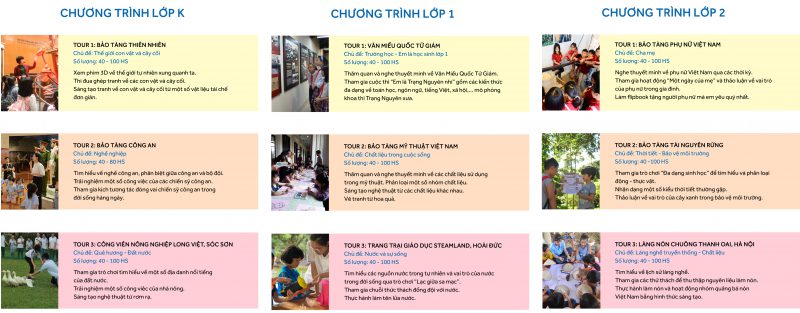Experiential learning (at the primary level) and experiential learning, career guidance (at secondary and high school levels) are compulsory educational activities implemented in the new general education program developed by the Ministry of Education and Training in 2018. A new point in the content of the program experiential learning is not limited to socio-political topics as in the current program but also focuses on personal and labor development activities, especially career education.
Many schools have started to apply this model in practice. At the same time, experiential education services (provided by out-of-School organizations such as research institutes, museums, educational farms, and event organizations) are also increasingly abundant. However, according to our observation and evaluation, the current experiential education models are still heavily formal and have not yet followed the educational goals.
To overcome the above limitations, and at the same time create opportunities for children to use the knowledge they have learned to explain the world around them and discover local knowledge values, and access to traditional cultural heritages systematically, HILL develops and delivers integrated experiential learning programs for schools. Accordingly, we select typical contents of the grade level and try to convey them through games, pictures, contests, etc. to promote the initiative of learners.
Photo: Activities in the experience learning trip with the topic "Cultural diversity of ethnic groups" at the Ethnic Culture and Tourism Village of Vietnam, Đồng Mô, Sơn Tây, Hà Nội by students of the Japanese International School
The program integrates diverse knowledge from natural sciences, economics to history, culture, laws, etc in out-of-school facilities. We consider and choose to exploit urgent global issues that are appropriate to the Vietnamese context based on references to educational content for sustainable development initiated by UNESCO such as gender equality, sustainable ecology, rights, laws, etc. We form a network of destinations and work closely with social partners such as research institutions, traditional craft villages, historical and cultural sites, museums, farms, etc. We bring in experts, researchers, artisans to support our programs.
Photo: Students from Alaska Elementary School are excited to learn about the Life Cycle of Butterflies through the Life Cycle Box making activity at Vạn Phúc Silk Village
Example of an experiential learning for students in grades Pre-Primary (K) through grade 5:






